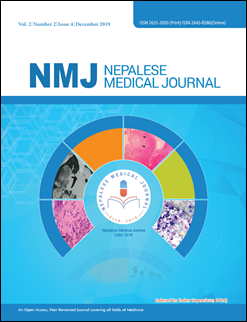A Comparative Study of RIPASA Score and Modified Alvarado Score in Acute Appendicitis in Nepalese Population
DOI:
https://doi.org/10.3126/nmj.v2i2.25369Keywords:
Acute appendicitis, Modified Alvarado score, RIPASAAbstract
Introduction: Although acute appendicitis is a common surgical condition, its diagnosis can be elusive at times with misdiagnosis leading to serious complications. Various scoring systems have been developed to overcome this dilemma and the reported accuracies of these scores vary greatly.
Materials and Methods: A retrospective review of charts was carried out to identify all patients admitted to KIST medical college teaching hospital from May 2015 to April 2016 with the diagnosis of acute appendicitis. A total of 120 cases that underwent surgery for suspected acute appendicitis were included. Modified Alvarado score and RIPASA scores were computed for each patient and the suggested cutoff values were used to find out the accuracy of these scores. Histopathological confirmation/report was considered as the standard for comparison.
Results: A negative appendectomy rate of 11.67 % was observed (9.64 % for males and 16.22 % for females). Complicated appendicitis was found in 27.36% of patients. Modified Alvarado score had a sensitivity of 61.32 % and specificity of 71.43 % at a cut of value of 7. At cut off of > 7.5 for acute appendicitis, RIPASA score had a sensitivity of 97.17% and specificity of 57.14%. The accuracy of Modified Alvarado score was 62.5% while it was 92.5% for RIPASA score.
Conclusions: RIPASA score demonstrated higher sensitivity and accuracy but lower specificity compared to the modified Alvarado score in our study group. More studies with larger sample size need to be carried out for further validation of this new score.
Downloads
Downloads
Published
How to Cite
Issue
Section
License
This license enables reusers to distribute, remix, adapt, and build upon the material in any medium or format, so long as attribution is given to the creator. The license allows for commercial use.
Copyright on any article published by Nepalese Medical Journal is retained by the author(s).
Authors grant Nepalese Medical Journal a license to publish the article and identify itself as the original publisher.
Authors also grant any third party the right to use the article freely as long as its integrity is maintained and its original authors, citation details and publisher are identified.




